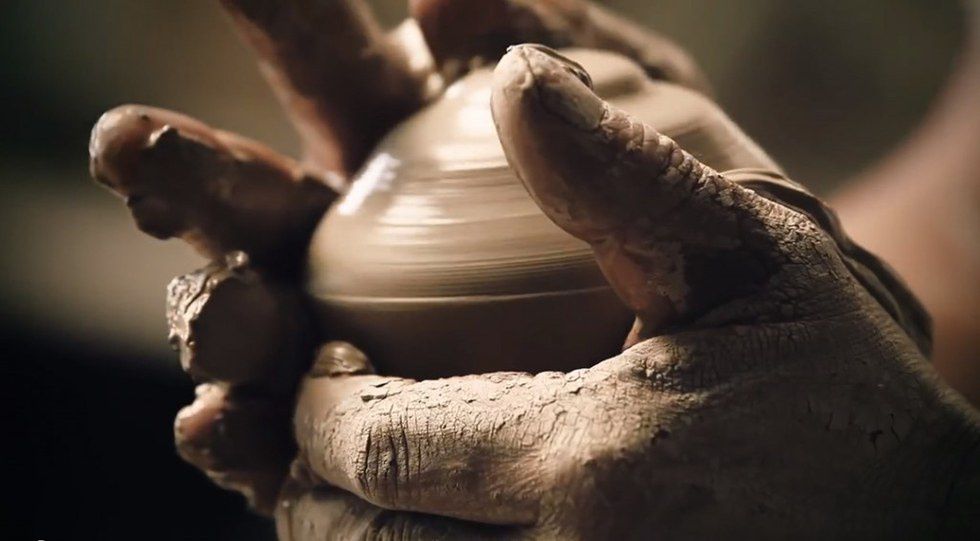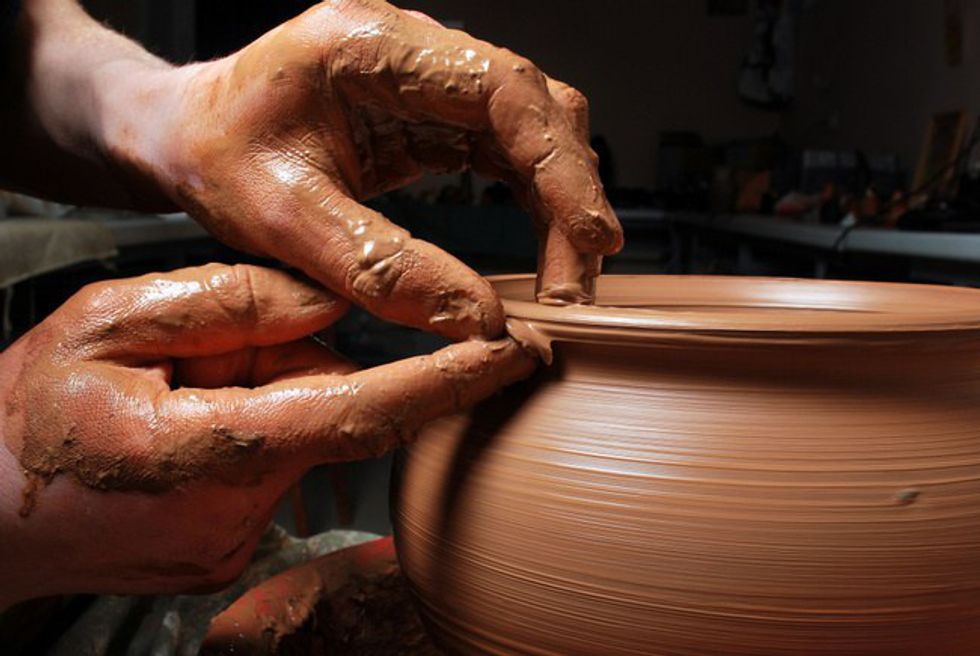Besides the days of working summer jobs, trying to swim as much as humanly possible, and having drinks with those friends from home that you miss the rest of the year, summertime is also the time to learn new things, expand your comfort zone and try out whatever you've been wanting to explore.
This summer, my artistic and generous mother let me tag along to her pottery classes, and apart from the task of actually learning how to coax clay into functional shapes, we've discovered that working clay comes with scoops of its own zen wisdom that can be applied to everyday life.
Sometimes it takes welcoming in a foreign experience and starting from the beginning to remind you that life is comprised of lessons no matter where you look.
Here are just a handful (wink nod) of lessons that pottery taught me this summer and I found useful enough to want to share with you.
1. Listen to your teachers. Like, really listen.
Beginning a new craft at 21, I was excited and wary of looking like an idiot. Sometimes, that tendency can make people (including me) try to do it our "own way" as if to say, "hey, I'm an adult and I got this!"
Uh-huh. Every time I tried to embellish on the technique my teacher showed me, the pot would wobble and get bent out of shape, almost to remind me that everyone starts as a beginner and toeing the line wasn't going to help anyone!
Stay humble and listen to those that know better than you. Working a potter's wheel and wet clay helps you notice when you're getting too big for your britches by immediately displaying your imbalances externally! No denying it.
2. Sometimes we all need a helping hand.
There are certain lessons in life, and in pottery, that you just cannot learn on your own. People like me like to think we can tackle the world on our own, and that our problems should be ours alone. Good luck if you think we will ever bother others with them, unless it's dire.
Working with clay is a highly personal art form, but when I couldn't get it right, my teacher just holds my hands under her own and helps me discover what she's talking about. Every learning style is different, but having a helping hand never hurts! You might find another perspective that works better.
3. Don't be afraid of mistakes.
Working with clay is both a delicate and forgiving medium because you can always scrap it and reuse the material, but it's so malleable that it's super easy to muck up in the creation process! One of the best aspects of pottery is the ease of starting over.
My teacher has her students that are too cautious of messing up intentionally wreck a piece on the wheel to feel the "worst case scenario" and get over it. She says that you can't learn what the line feels like until you drive straight past it. Being a perfectionist, this was a great lesson for me to learn.
4. Center yourself completely.
The first thing a potter will tell you is that an uncentered piece is a worthless and ugly one. In fact, the first thing you do on a wheel is make sure the clay is perfectly centered.
You can't hope for a centered piece unless you yourself are centered and peaceful. Centering means your hands and fingers are working in perfect balance on either side, your body is centered over the wheel and your mind is focused on the task at hand.
It's entirely tangible when the clay is slightly off, and a breath of fresh air when it's on.
5. Hold your calm in the storm.
Stand your ground. Let the clay work against your hands as the wheel turns the clay against the eroding rocks of your fingertips. If you let the clay take the wheel (pun intended), the piece will be ruined. Only by holding your power and taking up the space you are worthy of retaining just by your existence without apology.
Don't let the clay or anyone push you around. You are the defining rocks that alter other peoples' courses without you even noticing! The lessons you learn from others, others will learn from you too.
6. Balance is crucial.
The key to pottery is balance, particularly balance of pressure from your hands against the velocity of the wheel's spin speed and the consistency of the clay. Making sure the clay stays moist enough, your fingers are matching each other's pressure and going in the right direction at all times without uncentering the clay on the wheel gives the mind plenty to keep track of in real time!
It becomes the ultimate meditation of mind and body while the clay's earthy smell and feel grounds you completely. Plus, it's productive!
7. Find freedom within the rules.
Learning the technique is important and necessary to success in the making beautiful, useful pottery pieces. But, some of my favorite pieces I created over the course of this summer are the ones that went a little awry and became one-of-a-kind in the process. As with most anything you will attempt in your lifetime, working clay needs a basis of understanding for the chemistry that makes it tick, but the serious fun comes with playing and bending the rules a little bit.
8. Don't sweat the small stuff.
" Happy accidents" find their way into everything on the planet, and clay is no exception. I have learned through pottery that little smudges or a slightly unbalanced pot is not the end of the world. Though I want to indulge my OCD tendencies of perfecting each piece for hours, my teacher would always encourage me, "You're done. Next!" She knew what I needed to hear to be productive and satisfied.
I have become happy to appreciate each piece's unique characteristics!
If you have a pottery studio nearby, or a friend that throws pots, jump in and explore the many lessons it has to offer, as well as the beautiful works of art that come of it!























